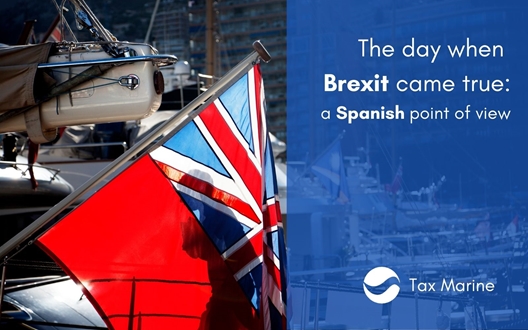I have had the chance to read a lot of literature in the past months on Brexit and how it would impact yacht owners and maritime operators. Today, early January 2021, the countdown is over and a new relationship between the UK and Europe began, with its pros and cons. On Thursday 31st December 2020, the European Commission published the EU-UK Trade and Cooperation Agreement. The agreement provides for cooperation between the EU and UK and contains specific titles on maritime transport and taxation. In addition, national authorities published different regulations and guidelines anticipating the outcome of this new legal framework. In this notice we would like to highlight a few key points with a special impact on the yachting industry.
Yacht VAT status
Private persons
Last December 2020 the HMRC published Notice 8, titled “Sailing your pleasure craft to and from the UK”, which covers different key aspects related to the VAT status of pleasure yachts. In this regard, the UK tax authority confirmed that any yachts acquired by UK residents would be subject to UK VAT and customs, unless they were located in the UK before the end of the transitional period on 31st December. The flip side of this new reality is that any VAT paid or deemed VAT pleasure yacht owned by UK residents and not located in EU waters on that date would lose its VAT paid status. Thus, from the first of January 2021, yachts located in the UK as of 31st December 2020 are no longer in free circulation in the EU, but under the Temporary Admission customs mechanism and subject to the limitations stipulated in that regime. Among others, use restricted to non-EU residents and a temporary limitation of 18 months to stay in EU waters.
The Spanish tax agency –AEAT– published its own guidelines on this matter that cover the most problematic issues in the bilateral UK – Spain trade relationships. However, in these guidelines, there are no particular references to pleasure yachts and future tax treatment. It is our understanding that the above approach is in force in Spain, on the basis of the reference made by the Spanish tax authorities to the Withdrawal Agreement between the United Kingdom and the EU.
Taxable Persons
As advised by the Directorate-General for Taxation and Customs Union in its notice of 10 December 2020, in accordance with Article 51(2) of the Withdrawal Agreement, the taxable person’s rights and obligations under EU VAT law continue to apply when the transaction between the United Kingdom and the EU took place before the end of the transition period, therefore, the re-importation of goods after the end of the transition period would be VAT exempted, provided the other conditions of Article 143(1)(e) of the VAT Directive were fulfilled.
The above approach applicable to taxable persons would imply that yachts located in the UK and returning to Europe could be reimported under the returned goods relief mechanism set forth in the Union Customs Code and remain in free circulation.
Cross-border VAT refund
As a general rule, taxable persons must recover VAT through the VAT return when they are VAT registered in the country where VAT was incurred. Otherwise, VAT can be recovered through an EU cross-border refund system. From the 1st January 2021, UK companies will no longer be eligible for cross-border VAT refund under the provisions of the 8th Directive, as they will be considered taxable persons not established in the territory of the Community.
Therefore, the appropriate procedure will be based on the 13th Directive. Eligibility for the refund in this case is stricter, and will require a reciprocity agreement between the country of refund and the country where the claimant is established. Besides, it will be necessary to appoint a fiscal representative to manage the process.
UK flagged yachts chartering in Spain
In order to minimize the impact of Brexit on yacht rental activities, the Spanish Maritime Administration published on 10 July 2020 the Instruction of Service 3/2020, clarifying that non-EU flagged yachts would no longer encounter difficulties for chartering in Spanish waters. Therefore, the impact of Brexit on UK flagged large and superyachts will not be very relevant, as red ensign yachts would remain eligible for a Spanish charter license.
Notwithstanding the above, there is a situation that will suffer changes, and which refers to UK flagged boats of less than 14 meters length. Up to this particular length, the Spanish Maritime Administration has historically established a cabotage restriction for Spanish or EU flagged boats. Since the UK left the EU club, boats under this length will no longer be entitled to obtain a charter license in Spain and therefore will be obliged to stop their activities or register under an EU flag.
- Finally, we want to highlight that any yacht intending to obtain a charter license in Spain should have previously been released for free circulation, meaning that VAT status should have been resolved. As per our previous review, we understand that there are some yachts owned by UK taxable persons that could keep free circulation status. However, in those cases where the status is lost, that circumstance does not seem to be a major issue, as there are still different alternatives available to import yachts into the EU, without a financial disbursement.






